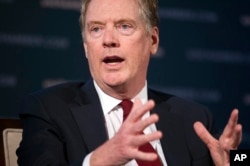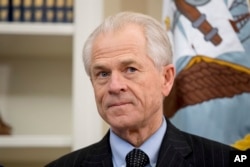China calls President Donald Trump’s threat to slap more tariffs on Chinese exports to the U.S. “extreme pressure and blackmail” and threatens to retaliate.
Beijing reacted Tuesday to Trump’s plan to impose tariffs on another $200 billion of Chinese goods “if China refuses to change its practices.”
“China apparently has no intention of changing its unfair practices related to the acquisition of American intellectual property and technology,” a presidential statement said late Monday. “Rather than altering those practices, it is now threatening United States companies, workers, and farmers who have done nothing wrong.”
The president has ordered Trade Representative Robert Lighthizer to identify a list of $200 billion in additional Chinese goods subject to a 10 percent tariff — a move that would bring on another round of Chinese penalties on American products.
Trump has already ordered 25 percent tariffs on $50 billion in Chinese products. Those penalties are scheduled to take effect next month and will likely be followed by Chinese countermeasures.
The U.S. has long accused China of stealing U.S. technology secrets, requiring U.S. firms to share intellectual property as a condition for doing business in joint ventures in China. China denies such theft and accuses Washington of “deviating from the consensus reached by both parties.”
The Director of White House National Trade Council, Peter Navarro, told reporters Tuesday the White House has given China every opportunity to change its “aggressive behavior.”
Trump and Chinese President Xi Jinping held a summit last year at Trump’s Mar-a-Lago resort. But that meeting and several rounds of trade talks between high-level officials in the past year have not yielded any progress.
“It is important to note here that the actions President Trump has taken are purely defensive in nature. They are designed to defend the crown jewels of American technology from China’s aggressive behavior,” Navarro contended.
U.S. stock market tumbled on Tuesday following the latest salvos between Washington and Beijing. The Dow Jones Industrial Average lost more than 1.1 percent at the close of trading and other major indexes posted losses as well.
But Navarro dismissed concerns about how the administration’s trade policy would affect the financial markets and global economy, saying it will have only a “relatively small effect.” He argued the U.S. steps will ultimately benefit the country and global trading system.
Navarro did not reveal plans for further trade talks between Washington and Beijing, but added, “our phone lines are open, they have always been open.”
Trump has said he has an excellent relationship with Chinese President Xi Jinping, but has also said “the United States will no longer be taken advantage of on trade by China and other countries in the world.”
He has imposed tariffs on aluminum and steel imports from Canada, Mexico, and the European Union and is feuding over trade with some of the United States’ closest allies.










